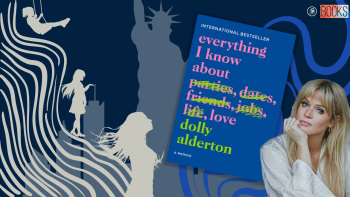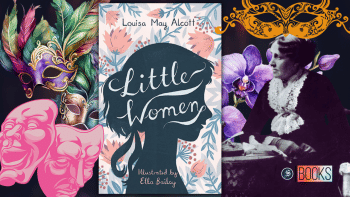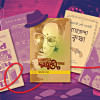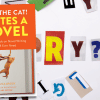She’s a terrible person, but that’s the point

I have always wondered what the word "forlorn" really meant.
More specifically, what it meant for someone to look that way. The dictionary described it as being, "pitifully sad and abandoned", and then there was the 18th century painting by Jacques Louis David, aptly titled, "Portrait of a Young Woman in White"—which includes a young woman sat on a chair gazing off into the distance, and she looks equal parts uninterested and lonely, somewhat uncharacteristically tired, like she's about to ask you, "What? Is anything wrong?" And that's how I figured it out. When I first came across this painting on the cover of Ottessa Moshfegh's second novel, My Year of Rest and Relaxation (Penguin Press, 2023), I think I finally understood what the word forlorn really meant. Whether it was merely for the interesting cover of the book or the joy of having a lightbulb go off in my brain, something really drew me to this book. And if the terribly cracked spine and hundreds of bookmarked pages now are any indication—it surely ended up becoming one of my most favourite books of all time.
My Year of Rest and Relaxation follows our unnamed (and arguably unreliable) narrator as she battles a terrible bout of millennial existentialism on the Upper East Side of Manhattan. A recent Columbia graduate, with an easy job at a hip art gallery, who has also managed to acquire a huge inheritance from two dead parents while still in her "roaring twenties"—which basically seems to have insured her an all-expenses-paid vacation for a life. Honestly, the synopsis prepared me for a rather unlikable character. The narrator was already tough to relate to—and surprisingly the first chapter does not really do much to redeem her either. Nor does the next, or the one after that.
In addition to being a self-proclaimed "young, thin and pretty" young woman, she is also miserable, misanthropic, and disingenuously self-effacing. And soon after, we are informed that her remedy to avoid her "problems" (the kinds that you cannot get rid of with your parent's money, of course) is to voluntarily put herself into a drug-induced coma. The title of the book is very literal in that sense. The narrator has quite literally planned to hibernate for an entire year in the hopes that when she finally wakes up from her "rest", she will be reborn and properly relaxed.
But this (obviously) happens a lot later in the book and for now, we are stuck with the same arduous monologues that have been unashamedly persistent on describing the world around her with a profound distaste. She hates her dead parents, she hates her best friend, she hates her ex-boyfriend, she sincerely hates her job because the art there is "just canned counterculture crap", and she absolutely loathes her own life.
Born to a father who ignored her and a mother who drank, she even regarded their deaths as acts of impassioned rejection on their part. And this warped idea of love and affection eventually bled into her own personal relationships—her only friend, Reva, is a character she is definitely not fond of, every interaction is accompanied by page-long descriptions of things our narrator absolutely hates about her. In fact, the first time we meet Reva, she is introduced with an exasperated, "Reva would show up at my apartment […] and insist on keeping me company. Her mother was dying of cancer. That, among many other things, made me not want to see her." Reva is always presented as inauthentic and insecure, even her concern for the narrator somehow leads back to Reva's own narcissism.
Then there is the character our narrator gratuitously obsesses over: her "recurring ex-boyfriend" from college, Trevor—a man almost ten years her senior who only uses her for sexual gratification. And even though the narrator is self-conscious enough to recognize his more than uncharitable interests she still desperately seeks him out throughout the entire story.
The only person she genuinely likes, apart from a group of non-English speaking Egyptians in her neighbourhood, is Dr Tuttle, her psychiatrist, or more specifically, the unrelenting quack doctor always prepared to conjure up dangerous recipes of drugs, both real and fictional, for every kind of discomfort imaginable. Antidepressants, sleeping pills, tranquillisers, anxiety medication, reams and reams of names of drugs. It seems as though the only reason our narrator is fond of Dr Tuttle is because she is the only one in this book not refuting, or even questioning, the narrator's plan of pseudo suicide. Even when the problem is so glaringly obvious—a girl so distressingly nonchalant, even when it comes to the consumption of animal tranquillisers, because she will gladly accept anything that allows her to completely numb herself.
I realise that until this point all I have done is complain about the narrator despite having claimed in the opening paragraph that I, in fact, really like the book. And I genuinely do. But given how the narrator was written with the intention of being so inherently unlikable, it is quite impossible to describe her without sounding like I'm making a joke out of her.
But despite that, it is also through these moments of emotional abandonment that I felt connected to her. While unusually harsh and unforgiving, she still managed to strike a chord with me. At times she's made me angry, roll my eyes in disgust, and question her morality, but she has also made me cry.
This book is not just about her senseless chemical hibernation, nor is it only a one-dimensional exaggerated retelling of events leading up to her self-imposed exile, it is an assessment of how different people choose to deal with grief and hopelessness.
It is an exploration into a twenty-something year old who is, at the very core, just incredibly alone and extremely sad. Even though she is so privileged and living in one of the most affluent places in the world—her experiences of trauma pertaining to her family, her boyfriend, her best friend, even herself on some occasions, is oddly universal.
Our narrator is just someone who is an unappealing result of a person at war with a part of herself that was birthed from the ignorance of the people around her. She was not supposed to form this distaste towards expressions of affection and love; it was learned behaviour. And while her resolution may be unusual, or more specifically, uncomfortable for most of us—it is still empowering to see a character like this finally achieve peace. As she describes it, "This was the beauty of sleep—reality detached itself and appeared in my mind as casually as a movie or a dream. It was easy to ignore things that didn't concern me." And there is something almost cathartic about her relationship with life and herself because of the risk she's willing to take by voluntarily sleeping off an entire year of her life, solely because she's "bored". It is easy to overlook the irrationality of it all and even romanticise it a bit. Because I personally would love it if I had a chance to just sleep for a whole year without consequences.
In a 2018 interview with Jezebel magazine, when asked if Ottessa Moshfegh would like to spend time with the protagonist of this book, she said, "I don't know if it would be a real nourishing friendship, but I have a feeling that in my darkness there would be a bond. I think I would maybe understand her too well. […] I have a feeling that if I was friends with her, I'd find her intimidating." And that is exactly how I feel about the narrator as well.
One of my favourite lines from this book was, "I was growing less and less attached to life. If I kept going, I thought, I'd disappear completely, then reappear in some new form. This was my hope. This was the dream."
She may be unlikeable, but she is fighting for something important—herself. And the best part: she is rebelling in the most fitting way anyone could in this age of relentless productivity that is so insistent on selling the idea of exhaustion as fulfilment—she is sleeping an entire year away.
Arshi Ibsan Radifah is a Lit major who loves unreliable narrators and Wes Anderson movie sets. If she had it her way she would have liked to play bass for a girl band in the 90s, but for now she'll suffice by rewatching Empire Records.

 For all latest news, follow The Daily Star's Google News channel.
For all latest news, follow The Daily Star's Google News channel. 









Comments